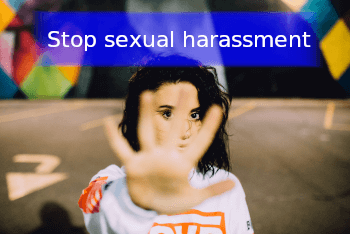What is sexual harassment?
What can I do if I have experienced it?
 There is a growing awareness of the problem of sexual harassment in the Irish workplace. More and more victims are seeking to exercise their right to work in an environment that is harassment free. In this article we look at the definition of sexual harassment in Ireland and what remedies are available to the victim of sexual harassment. The Employment Equality Acts 1998 - 2015 (The Acts) prohibit sexual harassment in the workplace. The Acts place a duty on all employers to prevent harassment at work, on the following grounds;
There is a growing awareness of the problem of sexual harassment in the Irish workplace. More and more victims are seeking to exercise their right to work in an environment that is harassment free. In this article we look at the definition of sexual harassment in Ireland and what remedies are available to the victim of sexual harassment. The Employment Equality Acts 1998 - 2015 (The Acts) prohibit sexual harassment in the workplace. The Acts place a duty on all employers to prevent harassment at work, on the following grounds;
-
Gender
-
Civil Status
-
Family status
-
Sexual orientation
-
Age
-
Disability
-
Race
-
Religious belief
-
Membership of the Traveller community
What is sexual harassment?
Sexual harassment is any form of unwanted verbal, non-verbal or physical conduct of a sexual nature. The conduct is defined as behaviour which has the purpose or effect of violating a person’s dignity and creating an intimidating, hostile, degrading, humiliating or offensive environment for the person.
The unwanted conduct can be in the form of spoken words, gestures or the production and display of written words, pictures and other material.
This definition of unwanted conduct is broad enough to encompass all current methods of communication analogue and digital.
Where can sexual harassment take place?
Sexual harassment can take place at work. This includes on a work related training course, trip or social event. Anything connected with your work is covered. It may be the case that the harassment took place at a venue unconnected with work, but you are being treated differently because you rejected (or accepted ) the advances made.
Who can carry out acts of sexual harassment?
A fellow worker, your boss or an employee in a superior position, a client, a customer,or any other business contact can carry out an act of sexual harassment.
What can I do if I have been sexually harassed?
The first step is to make it clear to the guilty party that you find their conduct, display of pictures or words etc offensive and intolerable. This can be hard to do on your own so you should seek the help and support of a friend or work colleague, who can assist you or indeed make an approach to the offending party on your behalf.
If the harassment continues in spite of the informal approach, the you need to make a formal complaint.
Check out your employers policy on harassment at work and the procedures to follow. The procedures should be detailed. They should set out how the complaint will be investigated, by whom, and what safeguards there are in relation to confidentiality and the rights to natural justice of the parties. See Employment Equality Act 1998 Code of Practice (Harassment) Order 2012 (Below)
If your employer does not have such a policy in place, then they will find it hard to come up with a defence to a claim for sexual harassment.
What should I do next ?
If you believe that you have been the victim of sexual harassment, please contact us. We will help and advise you with your claim and what steps you can take to help stop the harassment. We have over thirty years experience and will deal sensitively with your case.
![]() Remember there is a six month time limit for making a claim. You must take a claim within six months of the last act of harassment. The time limit can be increased on rare occasions for reasonable cause. You can contact us by clicking on the orange Yes! Tell Me More button below and filling in the details. We will contact you at a time that suits.
Remember there is a six month time limit for making a claim. You must take a claim within six months of the last act of harassment. The time limit can be increased on rare occasions for reasonable cause. You can contact us by clicking on the orange Yes! Tell Me More button below and filling in the details. We will contact you at a time that suits.
For more on sexual harassment case see
For more on bullying at work see
For more on discrimination and equality see
Employment Equality Act 1998 Code of Practice (Harassment) Order 2012, Download here
Code of Practice for Employers and Employees on the prevention and resolution of bullying at work, Download here






